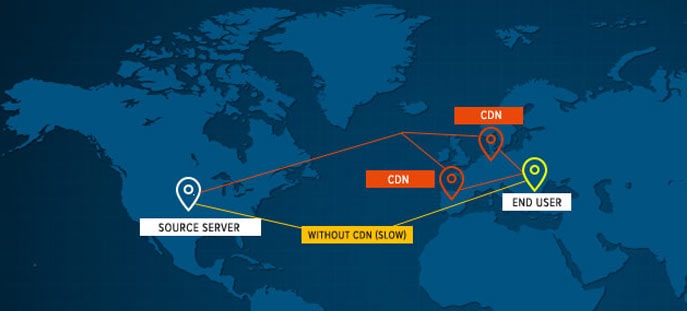Last Updated on by Vairo Kremanis

A lot of WordPress users wonder if they really need a CDN for their WordPress blog. Actually, far more WordPress users are probably not even completely sure what a CDN even is – and obviously, if you are not sure what something is or what it could do for you, then you are probably going to wonder whether or not it would even be worth the time, money, and energy required to pursue it… and rightly so.
But before we can answer that question, let’s talk for a moment about what a CDN actually is. What does it do? Is it helpful? If so, how does it help?
Figuring out the answers to these questions can do a lot to help you figure out if a CDN is something that your WordPress blog could benefit from… so let’s talk about them.
First Off, What Is A CDN?
CDN stands for ‘Content Delivery Network.’ Explaining this can quickly become very technical – so we are going to do our best to keep the concept simple and brief. If you wish to figure out the technicalities, then there are dozens of different websites that you can visit to read about them.
But in essence, a CDN makes websites load faster all around the world. CDNs consist of networks of servers that are dispersed geographically, which help to deliver cashed content to end users in different areas… based on the actual geographic locations of the users. Obviously, the origin of the content itself also plays a factor, as does the content delivery edge server – but yes, this is basically what a CDN is supposed to do, and it works very well.

Major Websites all around the world all utilize CDNs to help their websites load faster, regardless of where the user is located… and yes, CDNs can also help your WordPress blog to load faster too.
But, it is important not to confuse a CDN with web hosting.
What Is Web Hosting, And How Does A CDN Fit Into That Picture?
To put it quite plainly, the ‘hosting company’ is the company that holds the contents of your site. This is done with a bunch of servers located in a data center, unless you are hosting your own website on your own private server… but most websites (and WordPress sites) use a hosting service.
Even if you plan to use a CDN, you still need web hosting. But… a CDN can integrate with your web host and make your website load faster for users all over the world. The CDN basically accomplishes this by copying important parts of your website and dispersing those parts to different servers and data centers around the globe.
This means that users located in different parts of the world can access the vital parts of your site from the nearest data center, instead of having to use just the data center that your site is technically stored on.
This equates to faster load times – which gives you a lot of advantages.
Yes, You Should Probably Use A CDN For Your WordPress Blog, And Here Is Why…
There are several reasons for why you might want to use a CDN for your WordPress Blog.
First of all, this will make your site load faster for users in other geographic locations – which is obviously a good thing.
It will also increase the crash resistance of your blog. Plus, it is fairly common knowledge that faster sites usually do better with visitors and traffic. Bounce rates tend to go down, and page views tend to go up when sites become faster – and a CDN can directly influence the actual speed with which your site will load for users around the world.
And last, but definitely not least, a CDN can help you with SEO. It is a well-known fact that faster websites rank better with Google… so a CDN will definitely help to improve your search engine results.
How Do You Get Started With CDN For Your WordPress Blog?
There are obviously a lot of different CDN companies out there. One company that we really liked the looks of can be found at MaxCDN.com. Their CDN services can easily be used with WordPress blogs, and they offer some pretty awesome services at affordable prices.
But of course, this is just one example. Finding the right CDN Company is a choice that will take time, research, and self-education. But if you hope to grow your WordPress blog and gain more viewers, it may be a step that could pay big dividends in the future.








